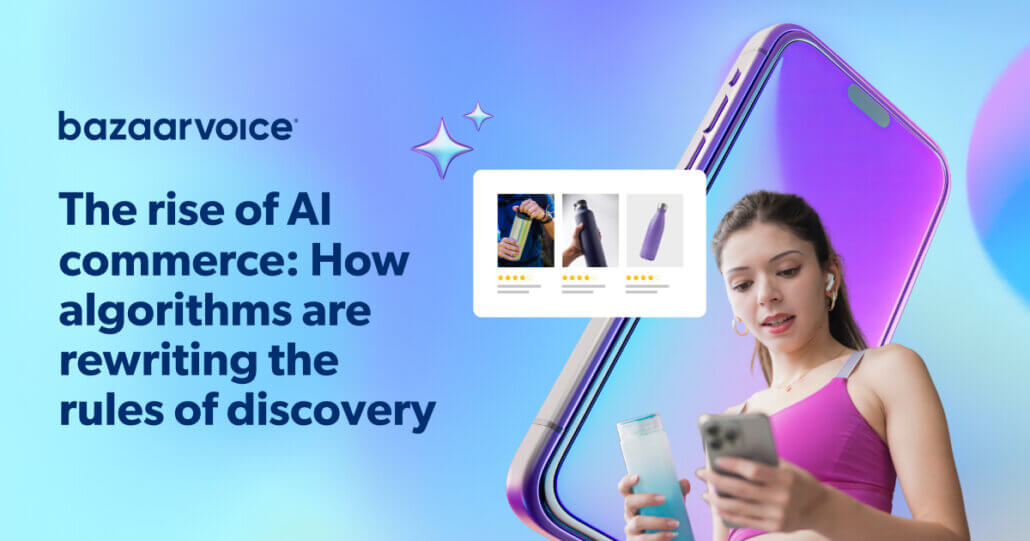July 14, 2025
Not surprisingly, we’re hearing a new question from some of the most forward-thinking brands:
“As more consumers use AI tools instead of traditional search engines, are product reviews still as valuable as they used to be?”
Douglas Straton, Chief Customer Evangelist & Retail Growth Officer at Bazaarvoice, walks us through the importance of reviews in the age of AI. Accompanied by some quick and handy tips to kickstart your AI powered UGC journey.
The tools people use to research and buy products are changing fast. But here’s what I’ve found so far:
In a world of AI-powered shopping, reviews aren’t losing value — they’re becoming a key asset in the training of LLMs with trustworthy content. LLMs “know” they need authentic content fed in, displayed, and yes, summarized to win over shoppers. Reviews and other product-related content like video and images, properly structured, are essential.
Authentic and verified reviews are gaining relevance
Consumers are turning to generative AI tools like ChatGPT, Google’s AI Overviews, and Perplexity to ask questions like:
- “What’s the best face sunscreen for oily skin?”
- “Are [brand] shoes worth the price?”
- “What’s the top-rated tax software for freelancers?”
These tools don’t automatically return links like a search engine. They return synthesized, conversational answers — answers that rely heavily on consumer reviews to fill in the real-world gaps.
LLMs know that people trust other people, and reviews and other product-related UGC reveal how a product performs in the wild — something brands don’t always capture in a bulleted list of features.
Don’t take our word for it, ask AI
Still unsure? You don’t have to take it from us. Ask AI directly.
Try prompts like:
- “Where do you get your information when recommending products?”
- “Do product reviews influence your answers?”
- “What do people say about [your brand or product]?”
Then test with:
- “What’s the best [product type] for [specific use case]?”
- “Is [Brand A] better than [Brand B]?”
You’ll notice AI tools consistently pull in customer sentiment, pros and cons, and product comparisons. That’s because AI is built to surface content that feels real, personal, and trustworthy.
Reviews and product-related UGC like video and images aren’t just influencing shoppers anymore, they’re influencing the machines that help shoppers decide.
The machines want to solve the trust problem
AI models may generate answers that sound plausible — but are factually wrong or made up. It’s not intentional deception; it’s the model trying to “fill in the gaps” based on flawed or incomplete data.
Within a shopping context, this can do real harm:
- Misinforming consumers
- Misrepresenting your brand
- Damaging trust and credibility
This makes high-quality, authentic inputs more important than ever. As always in digital, “Garbage In, Garbage Out”: AI is only as good as the data it learns from and retrieves at runtime. If that content is biased, stale, synthetic, or low quality — hallucinations increase and this – just like an inaccurate Product Detail Page (PDP) – can potentially degrade your brand, products or offerings.
Authentic reviews improve trust in output
Authentic user-generated content (UGC), especially verified product reviews, helps AI models stay grounded in reality by offering:
- Real-world product context
- Human validation and diversity of opinion
- Fresh, up-to-date sentiment
- Firsthand experiences, including pros, cons, and edge cases
The result? Smarter, safer, and more accurate AI recommendations.
For years, Bazaarvoice has been innovating in trust and authenticity – most recently with the launch of the Bazaarvoice Intelligent Trust MarkTM. Those brands and retailers within the Bazaarvoice Network reflect the confidence of our authenticity and moderation capabilities by incorporating a badge to demonstrate trust. LLMs ingest the “trust signal” to measure the reliability of the data they are using.
When shoppers ask AI assistants for product advice, authenticity and accuracy wins. Brands with robust, high-quality, and frequently updated review content have a significant edge in visibility and credibility — power of AI generated reviews.
What this means for brands and what we’re doing
Does any of this sound familiar? It should! Fifteen years ago, retailers were in a race to get accurate product images, copy, bullets and, yes, ratings and reviews onto PDPs. The environment was still new enough that a lot of data being used was being pulled from anywhere a retailer or their suppliers could find. Much of it was inaccurate, out-of-date, or poor quality, resulting in a terrible shopper experience. Yet we found ways to clean it up, and those companies that did the best job were rewarded with higher traffic, engagement and conversion.
The shift to AI-driven discovery is similar, and should be seen as an opportunity to influence your “Share of Voice” or more accurately, “Share of Summary”. But only if your brand is diligent about providing and maintaining accurate and authentic structured data.
The same tactical focus that drives greater engagement and conversion works with AI:
- Maintain good data hygiene: Across all elements of product related data.
- Increase review coverage: Make sure your key products have a critical mass of authentic reviews to feed the machines.
- Maintain recency: Keep content flowing through review requests, sampling, and campaigns
- Enrich reviews: Add context through review submission forms (e.g., skin type, fit, use case).
- Highlight authenticity: Turn on the Intelligent Trust Mark and stay up to date on authenticity best practices.
Reviews are a trust signal for humans making shopping decisions and AI providing information about what’s worth recommending or summarizing.
So, yes, reviews still matter…and there is work to be done
The brands who maintain great digital shelf compliance, and focus on the human component of reviews and other UGC will win the future of commerce powered by AI generated reviews. Just as those focus on best-in-class PDPs outperform. This is not the time to pull back. It’s the time to lean in. Pulling back on verified authentic content, particularly right now when the new rules are being written, means potentially falling behind.
So go ahead — ask AI what matters. And keep asking. The rules will continue to evolve until we reach a settling point. We’re not stable yet, but you can count on Bazaarvoice to continue monitoring the landscape for you. In the meantime, let us know if you’re interested in working together to explore this new element of shopping.





